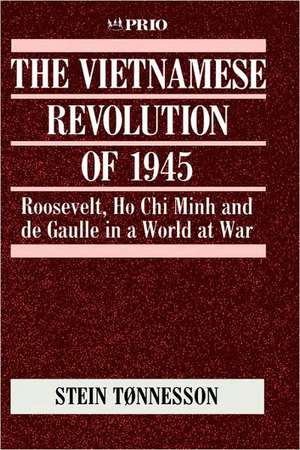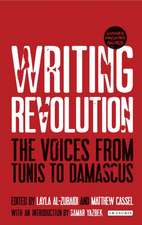The Vietnamese Revolution of 1945: Roosevelt, Ho Chi Minh and de Gaulle in a World at War: International Peace Research Institute, Oslo (PRIO)
Autor Stein Tonnessonen Limba Engleză Hardback – 5 sep 1991
Preț: 1274.94 lei
Preț vechi: 1554.81 lei
-18% Nou
Puncte Express: 1912
Preț estimativ în valută:
243.95€ • 255.40$ • 201.86£
243.95€ • 255.40$ • 201.86£
Carte tipărită la comandă
Livrare economică 07-21 aprilie
Preluare comenzi: 021 569.72.76
Specificații
ISBN-13: 9780803985216
ISBN-10: 0803985215
Pagini: 470
Dimensiuni: 156 x 234 x 27 mm
Greutate: 0.84 kg
Ediția:1
Editura: SAGE Publications
Colecția Sage Publications Ltd
Seria International Peace Research Institute, Oslo (PRIO)
Locul publicării:London, United Kingdom
ISBN-10: 0803985215
Pagini: 470
Dimensiuni: 156 x 234 x 27 mm
Greutate: 0.84 kg
Ediția:1
Editura: SAGE Publications
Colecția Sage Publications Ltd
Seria International Peace Research Institute, Oslo (PRIO)
Locul publicării:London, United Kingdom
Recenzii
`The chief value of this book, and why it is highly recommended, is its wealth of detail about what was the single most crucial moment for the Vietnamese in the entire 20th century' - Indochina Chronology
`Through masterful and impressive control of a wealth of detail combined with a complex and subtle but gracefully persuasive argument, the author presents an authoritative account of how Ho Chi-Minh and his followers achieved power at the end of WW II' - Choice
`This is unquestionably the most fully documented study of the Western language sources for the interantional history of the August Revolution. And we are in the author's debt for his interesting theoretical and historiographical discussion of the August Days and their implications for our understanding of revolutions in general and the Vietnamese Revolution in particular. The Vietnamese Revolution is a superbly crafted and brilliantly organized structure' - Pacific Affairs
`The result is a book based on exceptionally fine research, with a good theoretical underpinning.... [Tonnesson] is an excellent researcher and someone of deep reading and knowledge of social scientific theory' - Peace and Change
`Those readers fortunate enough to be familiar with Stein Tonnesson's previous works are well aware of his ability to combine meticulous scholarship with a penchant to question accepted wisdom. In this book, Tonnesson maintains these high standards, shedding important new light on one of the less well-known periods of modern Vietnamese history: the years leading up to the August Revolution of 1945' - American Historical Review
`The author's work is the most complete we have and consequently becomes a 'must read' for every serious student of Vietnam....Tonnesson has taken on an enormously complex and very important task. In general he acquits himself well, and scholars in the field should welcome this work warmly' - Pacific Historical Review
`Tonnesson has provided us with the best account to date of the interaction of international and internal causes bringing about the Vietnamese Revolution of 1945' - Asian Studies Review
`Through masterful and impressive control of a wealth of detail combined with a complex and subtle but gracefully persuasive argument, the author presents an authoritative account of how Ho Chi-Minh and his followers achieved power at the end of WW II' - Choice
`This is unquestionably the most fully documented study of the Western language sources for the interantional history of the August Revolution. And we are in the author's debt for his interesting theoretical and historiographical discussion of the August Days and their implications for our understanding of revolutions in general and the Vietnamese Revolution in particular. The Vietnamese Revolution is a superbly crafted and brilliantly organized structure' - Pacific Affairs
`The result is a book based on exceptionally fine research, with a good theoretical underpinning.... [Tonnesson] is an excellent researcher and someone of deep reading and knowledge of social scientific theory' - Peace and Change
`Those readers fortunate enough to be familiar with Stein Tonnesson's previous works are well aware of his ability to combine meticulous scholarship with a penchant to question accepted wisdom. In this book, Tonnesson maintains these high standards, shedding important new light on one of the less well-known periods of modern Vietnamese history: the years leading up to the August Revolution of 1945' - American Historical Review
`The author's work is the most complete we have and consequently becomes a 'must read' for every serious student of Vietnam....Tonnesson has taken on an enormously complex and very important task. In general he acquits himself well, and scholars in the field should welcome this work warmly' - Pacific Historical Review
`Tonnesson has provided us with the best account to date of the interaction of international and internal causes bringing about the Vietnamese Revolution of 1945' - Asian Studies Review
Cuprins
Introduction
A Placid Haven
A Nation-in-Waiting
The Viet Minh
Colliding Plans
Deception and False Expectations
End of an Order
A Shadow
A Nation-State Founded in Famine
Two Theatres of War
Two Strategies of Insurrection
August
Conclusions
A Placid Haven
A Nation-in-Waiting
The Viet Minh
Colliding Plans
Deception and False Expectations
End of an Order
A Shadow
A Nation-State Founded in Famine
Two Theatres of War
Two Strategies of Insurrection
August
Conclusions
Notă biografică
Stein Tonnesson is a Research Fellow at the International Peace Research Institute, Oslo. He is the author of several scholarly articles and books, including 1946: Outbreak of the Indochina War (l¿Harmattan, 1987).
Descriere
This definitive and thorough exploration of the causes and course of the Vietnamese Revolution of August 1945 provides new insights from hitherto unexploited archival sources.
The strength of the book lies in encompassing the history of the Vietnamese Revolution in discussions of broader theoretical issues and in placing it within the context of international developments at the time. Two causal chains are established, one starting with the founding of the Indochinese Communist Party in 1930, the other with President Roosevelt's intense preoccupation from 1943 to 1945 with the future of French Indochina.













